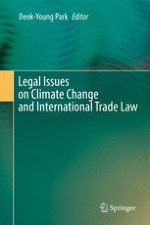
2016 | OriginalPaper | Buchkapitel
The Interface Between the Trade Rules and Climate Change Actions
verfasst von : Gabrielle Marceau
Erschienen in: Legal Issues on Climate Change and International Trade Law
Aktivieren Sie unsere intelligente Suche, um passende Fachinhalte oder Patente zu finden.
Wählen Sie Textabschnitte aus um mit Künstlicher Intelligenz passenden Patente zu finden. powered by
Markieren Sie Textabschnitte, um KI-gestützt weitere passende Inhalte zu finden. powered by